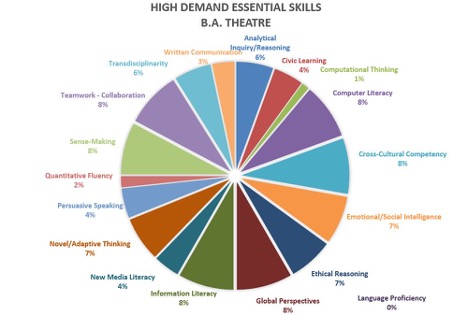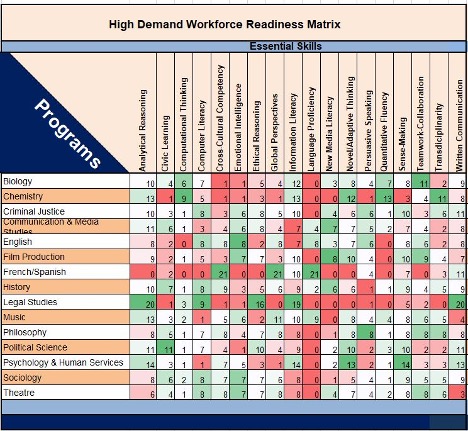
Workforce Readiness
Gain the skills necessary to be prepared for a 21st century workforce.
Become empowered through the acquisition of 18 High Demand Essential Skills (HIDES) designed by The College of Arts & Sciences @ Clayton State University to endow you with the tools for success. To help you achieve this goal, we consulted with employers, hiring managers, as well as alumni about what made them successful in their careers. They reported that it was these 18 HIDES that gave them the competitive advantage in today's uncertain economy. This site is intended to help you to discover, to understand, and to articulate the value of which HIDES you are acquiring or building upon while developing into the most desirable candidates on the market. All of our undergraduate majors offered within the College of Arts & Sciences have been linked to the following HIDES.
High Demand Essential Skills (HIDES)
- Analytical Inquiry/Reasoning = The capacity to recognize, describe and effectively solve problems through differentiation, categorization and other relevant tools of inquiry and reasoning.
- Civic Learning = The ability to evaluate, articulate and respond to political, social, environmental and economic challenges at local, national, and global levels.
- Computational Thinking = The power to translate vast amounts of data into abstract concepts and to understand data-based reasoning.
- Computer Literacy = The potential to use computers and related technology efficiently and productively.
- Cross-Cultural Competency = The ability to operate and engage in diverse cultural setting.
- Emotional/Social Intelligence = The means to connect to others in a deep and direct way, to sense and stimulate reactions and desired interactions.
- Ethical Reasoning = The judicious and self-reflective application of ethical principles and professional or occupational codes of conduct to making decisions, taking action, and resolving issues.
- Global Perspectives = The intellectual flexibility that enables viewing the world through the eyes of others from different cultures, identities, personalities, places and times.
- Information Literacy = The capability to know how to find, organize and evaluate information through independent or collaborative inquiry in order to work with and perhaps contribute to it.
- Language Proficiency = The savoir faire to speak, read, write and comprehend an acquired language.
- New Media Literacy = The power to critically assess and develop content that uses new media forms and to leverage these media for persuasive communication.
- Novel/Adaptive Thinking = Proficiency at creative thinking and coming up with solutions and responses beyond that which is rote or rule-based.
- Persuasive Speaking = The ability to articulate, to engage audiences, and to present messages both orally and effectively.
- Quantitative Fluency = The ability to understand and use essential arithmetic skills, calculations and symbolic operations to construct, support and visualize valid arguments.
- Sense-Making = Dexterity in determining the deeper meaning or significance of what is being expressed.
- Teamwork-Collaboration = The skill to work productively, drive engagement, negotiate a strategy for group research or performance, and effectively communicate results as a member of a team.
- Transdisciplinarity = Literacy in and ability to understand concepts and complex problems across multiple disciplines.
- Written Communication = The ability to write effective and coherent explanations and arguments for multiple types of audiences with attention to the implications of language.
Center for Laker Student Success (C.L.A.S.S.)
We want you to be thinking and talking about your career readiness from orientation to graduation. Before your first job or graduate school interview, you will be able to reflect on, articulate, translate, and evaluate your readiness for the workplace. For this reason, the College of Arts & Sciences has established C.L.A.S.S., which will spearhead our efforts to:
- Help support our majors in their chosen direction while at Clayton and preparation for success in life after Clayton
- Enhance collaboration among faculty and alumni, and our institutional partners in admissions, advising, career services and student life
- Link more intentionally academic and career advising
- Grow and strengthen relationships with core employers and community partners
- Improve undergraduate preparation for graduate and professional schools (including Clayton)
- Develop and distribute resources to help students and their parents identify the connection between course outcomes and careers
HIDES Matrices
Employers have told us that acquiring these HIDES is more important than any undergraduate major. And not all majors yield the same results. Some programs focus on only a few of these high demand essential skills, while others touch on practically all of them.
For example, below is the HIDES Workforce Readiness Matrix for our B.A. in Theatre program.
The numbers indicate percentage of course outcomes within that program which help students to develop a given skill. As you can see, if you were to major in Theatre, a fairly broad discipline, you would get large doses of Cross-Cultural Competency, Emotional/Social Intelligence, Global Perspectives, Information Literacy, Sense Making, Transdisciplinarity and Teamwork - Collaboration, but not as much Computational Thinking, Language Proficiency, or Quantitative Fluency.

Here is an overview of the HIDES Workforce Readiness Matrix for all of our major programs. The GREEN squares show where HIDES are particularly strong; RED, not so much.

